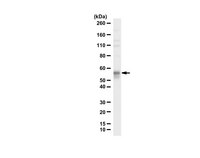ABE2860-25UL Sigma-AldrichAnti-KLF4
Anti-KLF4, Cat. No. ABE2860, is a highly specific rabbit polyclonal antibody that targets Krueppel-like factor 4 (Klf4) and has been tested for use in ChIP-seq, Chromatin Immunoprecipitation (ChIP), Immunoprecipitation, and Western Blotting.
More>> Anti-KLF4, Cat. No. ABE2860, is a highly specific rabbit polyclonal antibody that targets Krueppel-like factor 4 (Klf4) and has been tested for use in ChIP-seq, Chromatin Immunoprecipitation (ChIP), Immunoprecipitation, and Western Blotting. Less<<Recommended Products
Přehled
| Replacement Information |
|---|
| References |
|---|
| Product Information | |
|---|---|
| Format | Serum |
| Presentation | Rabbit polyclonal antiserum with 0.05% sodium azide. |
| Physicochemical Information |
|---|
| Dimensions |
|---|
| Materials Information |
|---|
| Toxicological Information |
|---|
| Safety Information according to GHS |
|---|
| Safety Information |
|---|
| Packaging Information | |
|---|---|
| Material Size | 25 µL |
| Transport Information |
|---|
| Supplemental Information |
|---|
| Specifications |
|---|
| Global Trade Item Number | |
|---|---|
| Katalogové číslo | GTIN |
| ABE2860-25UL | 04054839638558 |
Documentation
Anti-KLF4 Certificates of Analysis
| Title | Lot Number |
|---|---|
| Anti-KLF4 - 3154338 | 3154338 |
| Anti-KLF4 - 3756547 | 3756547 |







